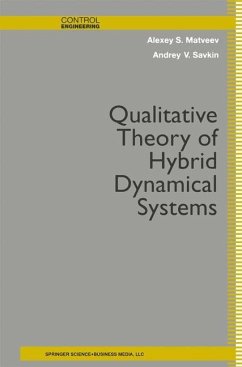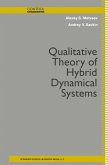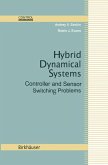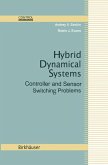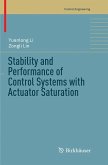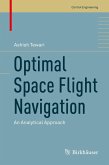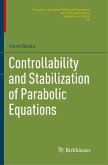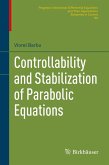The emerging area of hybrid dynamical systems lies at the interface of control theory and computer science, i.e., analogue 'and' digital aspects of systems. This new monograph presents state-of-the-art concepts, methods and tools for analyzing and describing hybrid dynamical systems.
Hybrid dynamical systems, both continuous and discrete dynamics and variables, have attracted considerable interest recently. This emerging area is found at the interface of control theory and computer engineering, focusing on the analogue and digital aspects of systems and devices. They are essential for advances in modern digital- controller technology. "Qualitative Theory of Hybrid Dynamical Systems" provides a thorough development and systematic presentation of the foundations and framework for hybrid dynamical systems. The presentation offers an accessible, but precise, development of the mathematical models, conditions for existence of limit cycles, and criteria of their stability. The book largely concentrates on the case of discretely controlled continuous-time systems and their relevance for modeling aspects of flexible manufacturing systems and dynamically routed queuing networks. Features and topics: _differential automata_development and use of the concept "cycliclinear differential automata" (CLDA)_switched single-server flow networks coverage_application to specific models of manufacturing systems and queuing networks_select collection of open problems for the subject_self-contained presentation of topics, with the necessary background This new book is an excellent resource for the study and analysis of hybrid dynamical systems used in systems and control engineering. Researchers, postgraduates and professionals in control engineering and computer engineering will find the book an up-to-date development of the relevant new concepts and tools.
Hybrid dynamical systems, both continuous and discrete dynamics and variables, have attracted considerable interest recently. This emerging area is found at the interface of control theory and computer engineering, focusing on the analogue and digital aspects of systems and devices. They are essential for advances in modern digital- controller technology. "Qualitative Theory of Hybrid Dynamical Systems" provides a thorough development and systematic presentation of the foundations and framework for hybrid dynamical systems. The presentation offers an accessible, but precise, development of the mathematical models, conditions for existence of limit cycles, and criteria of their stability. The book largely concentrates on the case of discretely controlled continuous-time systems and their relevance for modeling aspects of flexible manufacturing systems and dynamically routed queuing networks. Features and topics: _differential automata_development and use of the concept "cycliclinear differential automata" (CLDA)_switched single-server flow networks coverage_application to specific models of manufacturing systems and queuing networks_select collection of open problems for the subject_self-contained presentation of topics, with the necessary background This new book is an excellent resource for the study and analysis of hybrid dynamical systems used in systems and control engineering. Researchers, postgraduates and professionals in control engineering and computer engineering will find the book an up-to-date development of the relevant new concepts and tools.
"This study investigates the qualitative behaviour of hybrid systems.... This evolution is described by the coupling of the dynamics of an ODE and that of an automaton. Once the continuous state reaches a prescribed set S, the state of the automaton switches to another state and another ODE is activated. The main theme is the characterization of periodic behaviour of such systems and, when it is obtained, the study of its stability.... This mongraph is an exploration, and its merit is to convince the reader of the difficulty and richness of the topic under investigation." -Zentralblatt Math

